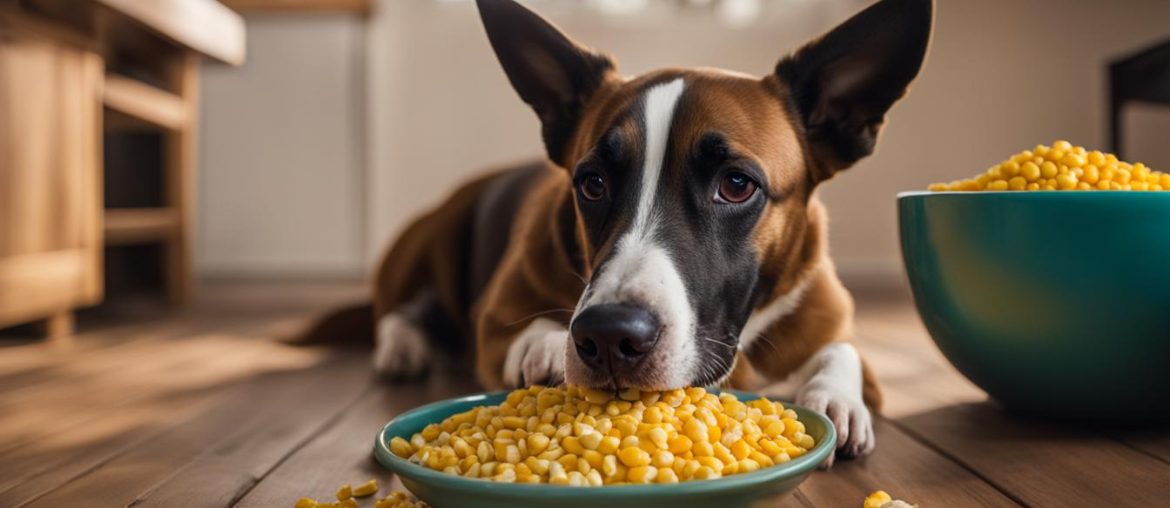When it comes to our furry friends’ diet, we want to ensure that we are making the best choices for their health and well-being. One question that often arises is whether dogs can eat corn. In this article, I will explore the facts and myths surrounding corn in a dog’s diet, shedding light on its safety, benefits, and potential drawbacks.
Key Takeaways:
- Corn is generally safe for dogs to eat and can be a nutritious addition to their diet.
- Cooked corn, like boiled or steamed kernels, can be safely consumed in moderation. Avoid excessive butter, salt, or other seasonings.
- Choose canned corn varieties without added seasonings, salt, sugar, or preservatives for dogs with corn sensitivity or on a corn-free diet.
- Avoid feeding dogs corn husks and cobs, as they can cause choking and bowel obstruction.
- Corn offers health benefits such as dietary fiber, vitamins, minerals, and antioxidants that support digestion, bone health, and eye health in dogs.
Is Cooked Corn Safe for Dogs to Eat?
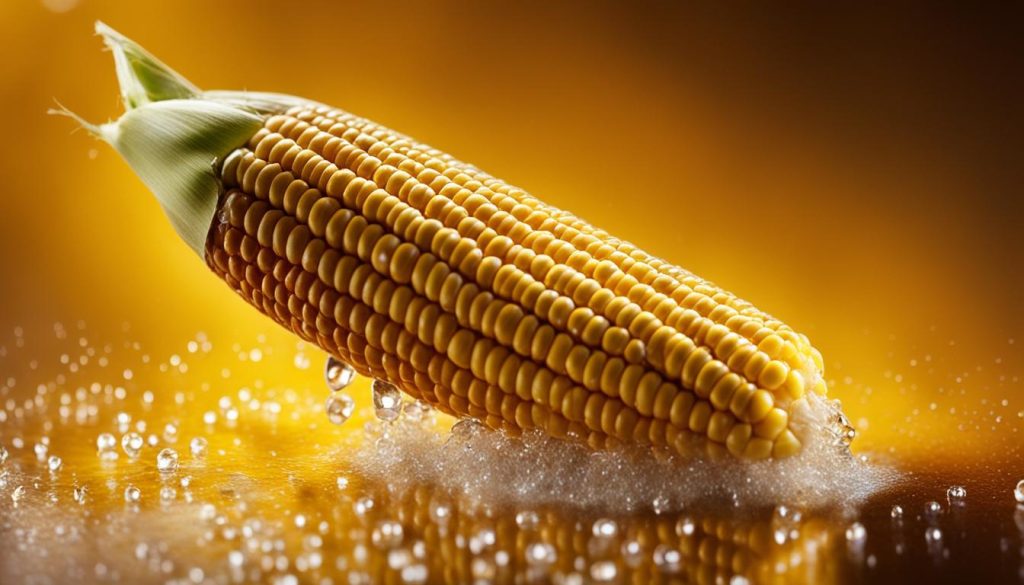
Cooked corn, such as boiled or steamed kernels, can be safely consumed by dogs in moderation. Cooking corn helps break down its tough outer shell, making it easier for dogs to digest. However, it’s important to avoid adding excessive butter, salt, or other seasonings when sharing corn with dogs. Additionally, corn should not be a primary source of nutrition and should be given as an occasional treat or mixed into their regular meals.
“Cooking corn helps break down its tough outer shell, making it easier for dogs to digest.”
“Dogs can enjoy a little bit of cooked corn as a treat, but it should never substitute a balanced meal. When sharing corn with your furry friend, make sure it is free from any added fats or seasonings that could be harmful.”
While cooked corn can be a tasty and nutritious addition to a dog’s diet, it is essential to remember that it should not be the main component or source of nutrition. Dogs have specific dietary requirements that should be met through a balanced and complete diet formulated for their needs. Corn should be given as an occasional treat or as part of a larger meal to ensure a well-rounded diet for your canine companion.
| Benefits of Cooked Corn for Dogs | Precautions when Feeding Cooked Corn |
|---|---|
|
|
Keep in mind that every dog is unique, and some may have specific dietary restrictions or sensitivities. If you have any concerns about feeding your dog cooked corn or any other specific food, it is always best to consult with your veterinarian. They can provide personalized advice based on your dog’s individual needs and help you make informed decisions regarding their diet.
Can Dogs Eat Canned Corn?
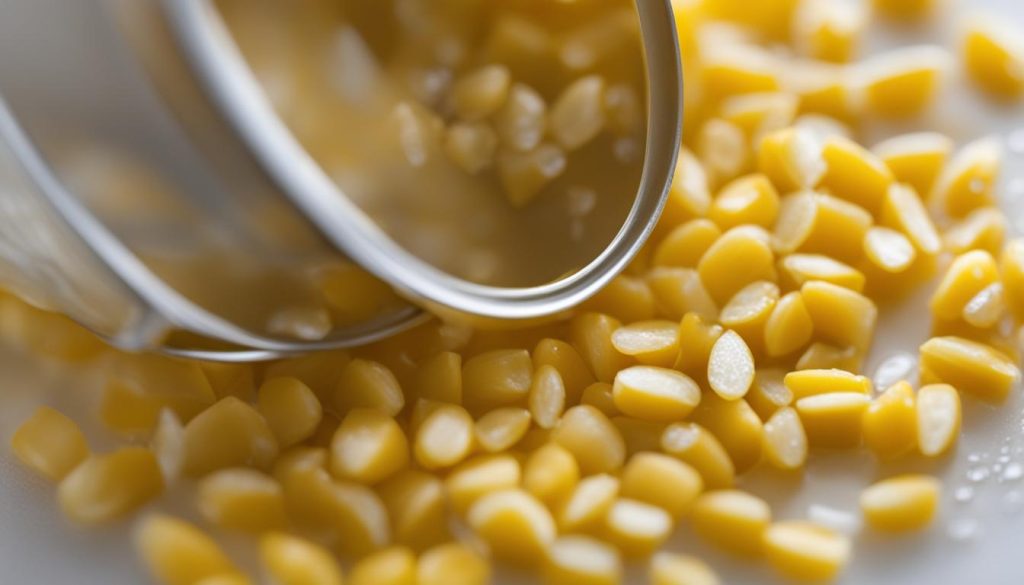
Dogs can safely eat canned corn, but it is essential to choose varieties without added seasonings, salt, sugar, or preservatives. These additives can be harmful to dogs and may cause digestive issues or sodium imbalances. When feeding your dog canned corn, opt for plain, unsalted varieties, and consider choosing organic options when available, especially if your dog has a sensitivity to corn or is on a corn-free diet.
Incorporating canned corn into your dog’s diet can provide some nutritional benefits. Corn is a good source of energy, carbohydrates, and dietary fiber, which can help promote healthy digestion. It also contains vitamins and minerals like vitamin A, vitamin C, and potassium, which are essential for overall well-being. However, it’s important to remember that corn should not be the main component of your dog’s diet, as dogs require a balanced and varied diet to meet all their nutritional needs.
Canned corn can be a convenient way to add some variety to your dog’s meals or to use as an occasional treat. However, always consult with your veterinarian before making any significant changes to your dog’s diet, especially if they have specific dietary restrictions or health conditions. Your veterinarian can provide personalized recommendations and advise you on the appropriate amount of canned corn to include in your dog’s diet.
| Benefits of Canned Corn for Dogs | Considerations for Canned Corn |
|---|---|
|
|
While canned corn can be a safe and nutritious addition to your dog’s diet when chosen and fed appropriately, it’s always important to monitor your dog’s overall health and well-being. If you notice any negative reactions or changes in your dog’s behavior or digestion after feeding them canned corn, discontinue its use and consult with your veterinarian for further guidance.
The Dangers of Corn Husks and Cobs for Dogs
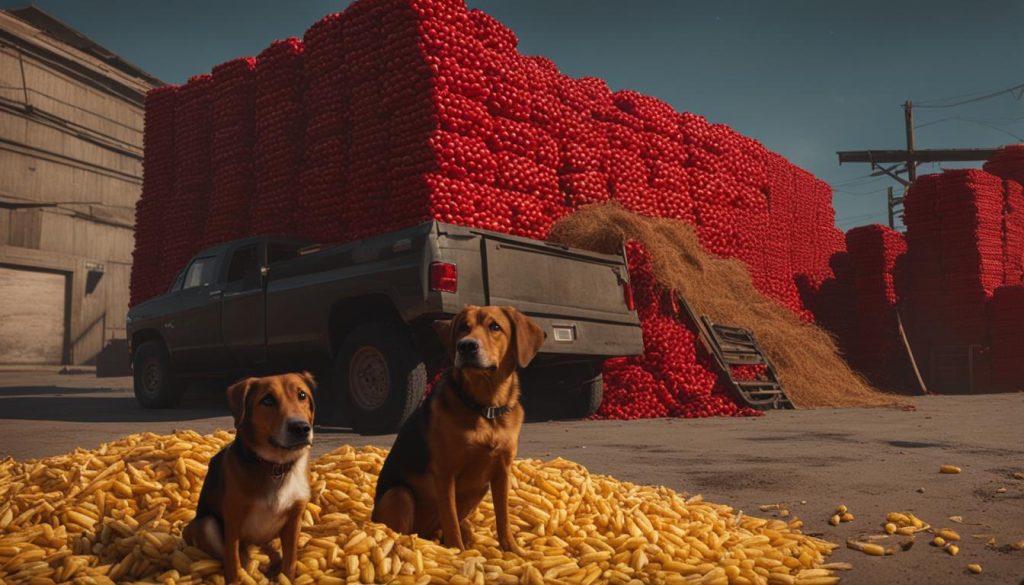
When it comes to feeding corn to dogs, there are certain parts that should be avoided at all costs – corn husks and cobs. While corn kernels are generally safe for dogs to consume, corn husks are indigestible and can cause serious gastrointestinal issues if ingested. Moreover, corn cobs pose a significant risk of choking and bowel obstruction, making them highly dangerous for our furry friends.
Chewing on corn husks can lead to the formation of intestinal blockages, which can be life-threatening for dogs. The fibrous nature of corn husks makes it difficult for them to pass through the digestive tract, causing discomfort, pain, and even complete obstruction. Additionally, corn cobs are hard and can easily get stuck in a dog’s throat, resulting in choking hazards that require immediate veterinary intervention.
Signs of Choking and Bowel Obstruction in Dogs
It is essential for dog owners to be aware of the signs of choking and bowel obstruction in dogs that have ingested corn husks or cobs. Some common symptoms to watch out for include:
Vomiting
Diarrhea
Lethargy
Loss of appetite
Abdominal pain
Difficulty passing stool
If you suspect that your dog has consumed corn husks or cobs and is showing any of these symptoms, it is crucial to seek immediate veterinary care. Early intervention can help prevent complications and potentially save your dog’s life.
| Choking Hazard | Bowel Obstruction |
|---|---|
| The fibrous nature of corn husks can cause choking hazards in dogs. | Corn cobs can lead to bowel obstruction, which is a serious health risk. |
| Chewing on corn husks can lead to the formation of intestinal blockages. | Corn cobs are hard and can easily get stuck in a dog’s throat, causing choking. |
| Immediate veterinary care is necessary if choking occurs. | Signs of bowel obstruction in dogs include vomiting, diarrhea, and lethargy. |
The Benefits of Corn for Dogs
Corn can offer several health benefits for dogs when fed as part of a balanced diet. It is a good source of dietary fiber, promoting healthy digestion and preventing constipation. Corn also contains various vitamins and minerals, such as vitamin B complex, magnesium, and phosphorus, which are essential for overall well-being and bone health. Additionally, corn contains antioxidants that support eye health and vision in dogs.
Here is a table summarizing the key health benefits of corn for dogs:
| Health Benefits | Description |
|---|---|
| Fiber content | Corn is a good source of dietary fiber, promoting healthy digestion and preventing constipation. |
| Vitamins and minerals | Corn contains various vitamins and minerals, such as vitamin B complex, magnesium, and phosphorus, which are essential for overall well-being and bone health. |
| Antioxidants | Corn contains antioxidants that support eye health and vision in dogs. |
Please be aware that while corn can provide these benefits, it should always be given in moderation and as part of a balanced diet. Consulting with a veterinarian is recommended to ensure the safety and appropriateness of introducing corn into a dog’s diet.
Image source: seowriting.ai
Understanding the Risks: Choking and Bowel Obstruction
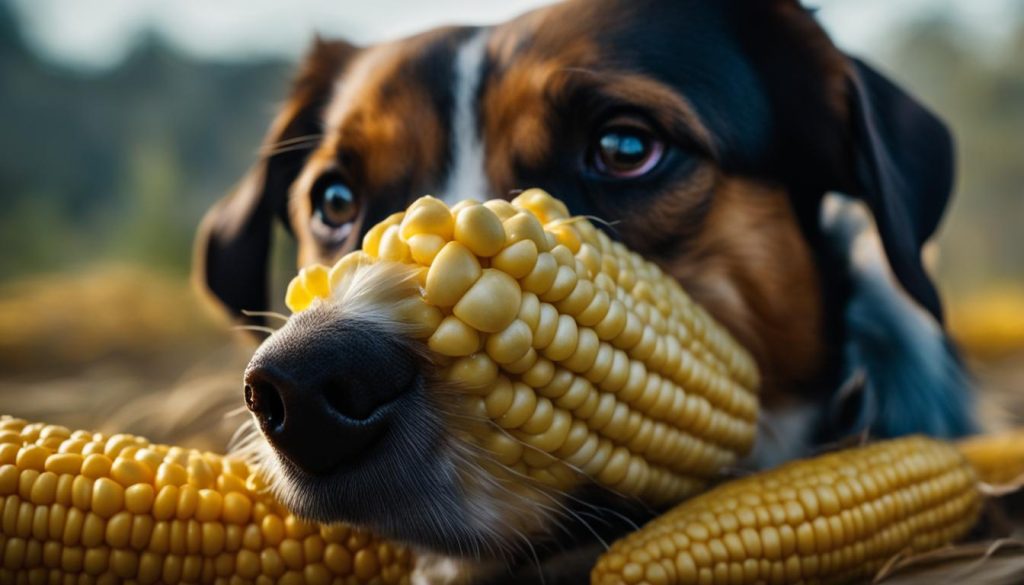
Dogs consuming corn cobs face significant risks, primarily related to choking and bowel obstruction. Corn cobs are hard and fibrous, making them difficult for dogs to digest. When dogs swallow large pieces of corn cob, it can lead to serious health complications such as pain, dehydration, and, in severe cases, death. Therefore, it is crucial for dog owners to be aware of these risks and take necessary precautions to prevent such incidents.
To mitigate the risks associated with corn cobs, it is essential to remove the corn kernels from the cob before feeding them to dogs. This ensures that dogs only consume the safe and easily digestible part of the corn. Additionally, immediate disposal of corn cobs in a dog-proof trash can is necessary to prevent dogs from accessing them and potentially choking or experiencing bowel obstructions.
Being proactive about these risks and taking preventive measures is crucial to safeguarding the well-being and health of dogs. By understanding the potential dangers associated with corn cobs, dog owners can make informed decisions and protect their furry companions from unnecessary harm and health complications.
Key Takeaways:
- Corn cobs pose risks of choking and bowel obstruction for dogs.
- Removing corn kernels from the cob before feeding them to dogs is essential.
- Proper disposal of corn cobs in a dog-proof trash can is crucial.
- Understanding and mitigating the risks associated with corn cobs is important in ensuring the well-being of dogs.
Table: Signs of Choking and Bowel Obstruction in Dogs
| Signs of Choking | Signs of Bowel Obstruction |
|---|---|
| Difficulty breathing | Vomiting |
| Pawing at the mouth | Loss of appetite |
| Excessive drooling | Abdominal pain |
| Gagging or retching | Difficulty passing stool |
| Blue or pale gums | Lethargy |
| Collapse | Dehydration |
It is important to note that if a dog is exhibiting signs of choking or bowel obstruction, immediate veterinary attention should be sought. Timely intervention can prevent further complications and ensure the best possible outcome for the dog’s health.
The FDA’s Investigation on Diet and Canine Dilated Cardiomyopathy (DCM)
The FDA has launched an investigation into a potential connection between diet and canine dilated cardiomyopathy (DCM) in dogs. This investigation focuses on grain-free dog food that contains legumes, such as peas, lentils, and potatoes. Canine dilated cardiomyopathy is a heart condition that affects the heart’s ability to pump blood effectively, leading to enlarged chambers and potentially life-threatening complications.
The investigation was prompted by reports of increased cases of DCM in breeds not typically prone to the disease. Concerns were raised that certain ingredients, particularly those used in grain-free dog food, may be contributing to the development of DCM. The FDA is working diligently to understand the potential link and provide guidance to pet owners and veterinarians.
While the investigation is ongoing, the FDA advises pet owners to consult with their veterinarians before making any changes to their dog’s diet. It is important to note that not all grain-free dog foods pose a risk, and many dogs on these diets have remained healthy. However, the FDA recommends considering diet diversity and ensuring that any diet chosen meets the individual nutritional needs of your dog.
The Dangers of Corn on the Cob for Dogs
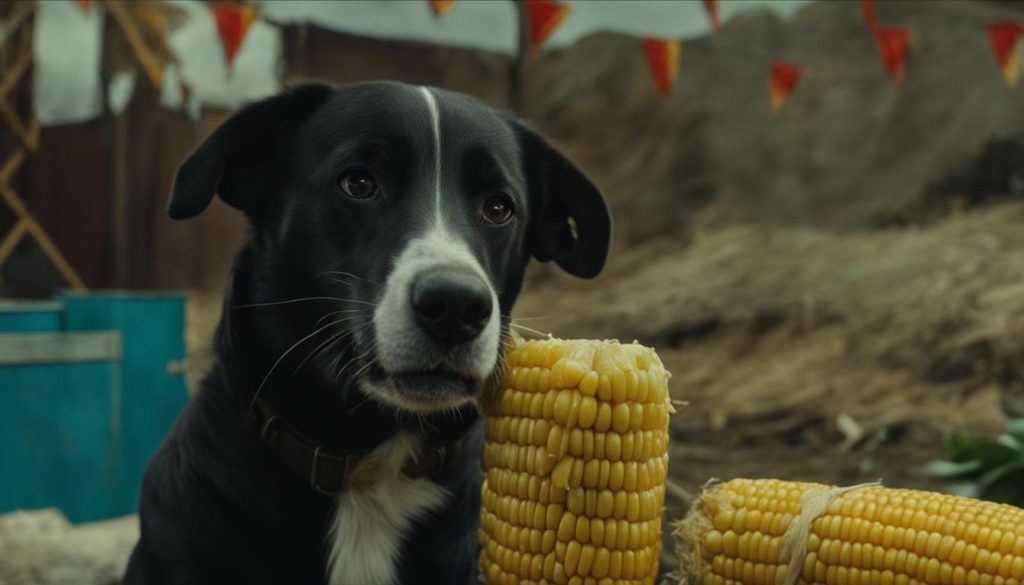
While corn is generally safe for dogs to consume, it’s important to be aware of the dangers associated with feeding them corn on the cob. The hard and indigestible nature of corn cobs poses significant risks to dogs, including choking and bowel obstruction. Ingesting corn on the cob can lead to a range of symptoms, such as vomiting, diarrhea, lethargy, loss of appetite, abdominal pain, and difficulty passing stool. In severe cases, it can obstruct the airway and cause serious health complications.
To prevent these dangers, it is crucial to keep corn cobs out of your dog’s reach. Dogs may be tempted to chew on corn cobs due to their appealing scent and texture. Therefore, it’s essential to securely dispose of corn cobs in a dog-proof trash can immediately after removing the kernels. Always be vigilant and ensure that corn cobs are inaccessible, especially during outdoor gatherings or barbecues where they may be readily available.
If you suspect that your dog has ingested corn on the cob or is exhibiting symptoms of a potential obstruction, it is crucial to seek immediate veterinary attention. Your veterinarian will be able to assess the situation, provide appropriate treatment, and potentially perform diagnostic tests such as X-rays to determine the extent of the problem. Remember, early intervention is key in preventing further complications and promoting your dog’s well-being.
| Symptoms of Corn on the Cob Ingestion | Actions to Take |
|---|---|
| Vomiting | Seek immediate veterinary attention. |
| Diarrhea | Remove access to additional corn cobs and monitor the dog closely. If symptoms persist or worsen, consult a veterinarian. |
| Abdominal pain or discomfort | Contact a veterinarian for guidance on the next steps. Do not administer any over-the-counter medications without professional advice. |
| Loss of appetite | Observe the dog’s behavior and monitor food intake. If the dog refuses to eat or drink for an extended period, seek veterinary attention. |
| Lethargy or weakness | Contact a veterinarian and describe the dog’s symptoms and behavior for further guidance. |
By being cautious and knowledgeable about the risks of corn on the cob, you can help protect your beloved furry friend from potential harm. Remember to provide dogs with safe alternatives and appropriate treats to ensure their overall well-being.
Wrapping Up
In conclusion, it is safe for dogs to eat corn as long as it is prepared and served properly. Cooked corn, such as boiled or steamed kernels, can be given to dogs in moderation. Canned corn without additives is also suitable for canine consumption. However, it is important to avoid feeding dogs corn husks and cobs, as they can pose serious health risks, including choking and bowel obstruction.
Corn can provide several health benefits for dogs, including promoting healthy digestion, supplying essential vitamins and minerals, and supporting eye health. Nevertheless, corn should always be part of a balanced diet and not the main source of nutrition. It is recommended to consult with a veterinarian to determine the appropriate amount of corn to include in a dog’s diet, taking into consideration any dietary restrictions or sensitivities.
In summary, dogs can eat corn, but precautions must be taken to ensure their safety. By understanding the risks associated with certain forms of corn and making informed choices, pet owners can incorporate this nutritious grain into their dog’s diet responsibly.
FAQ
Can dogs eat cooked corn?
Yes, cooked corn, such as boiled or steamed kernels, can be safely consumed by dogs in moderation. It is important to avoid adding excessive butter, salt, or other seasonings when sharing corn with dogs.
Can dogs eat canned corn?
Yes, dogs can eat canned corn, but it’s important to choose varieties without added seasonings, salt, sugar, or preservatives. Opting for plain, unsalted canned corn and choosing organic options when available is recommended for dogs with corn sensitivity or those on a corn-free diet.
Are corn husks and cobs safe for dogs to eat?
No, dogs should not eat corn husks or cobs. Corn husks are indigestible and can cause gastrointestinal blockages, while corn cobs pose a significant risk of choking and bowel obstruction. It is crucial to remove corn kernels from the cob before feeding them to dogs and dispose of the cobs in a dog-proof trash can.
What are the benefits of corn for dogs?
Corn can offer several health benefits for dogs when fed as part of a balanced diet. It is a good source of dietary fiber, promoting healthy digestion and preventing constipation. Corn also contains various vitamins and minerals that are essential for overall well-being and bone health. Additionally, corn contains antioxidants that support eye health and vision in dogs.
What are the risks of dogs eating corn cobs?
The most significant risks associated with dogs consuming corn cobs are choking and bowel obstruction. Corn cobs are hard and fibrous, making them difficult to digest. Swallowing a large piece of corn cob can cause serious health complications, including pain, dehydration, and, in severe cases, death.
What is the FDA investigating regarding canine dilated cardiomyopathy and diet?
The FDA is investigating potential links between diet, particularly grain-free pet foods containing legumes (such as peas, lentils, and potatoes), and canine dilated cardiomyopathy (DCM). Pet owners are advised to work with their veterinarians and obtain appropriate dietary advice before making changes to their dog’s diet.
What are the dangers of dogs eating corn on the cob?
Corn on the cob poses dangers to dogs due to its hard and indigestible nature. Dogs that ingest corn on the cob can experience symptoms such as vomiting, diarrhea, lethargy, loss of appetite, abdominal pain, and difficulty passing stool. In severe cases, corn on the cob can cause choking, obstruct the airway, and lead to serious health complications.
Can dogs eat corn as their primary source of nutrition?
No, corn should not be a primary source of nutrition for dogs. It should be given as an occasional treat or mixed into their regular meals as part of a balanced diet.
Should I consult a veterinarian before introducing corn into my dog’s diet?
Yes, consulting with a veterinarian is recommended to ensure the safety and appropriateness of introducing corn into a dog’s diet, especially for dogs with specific dietary needs or sensitivities.


